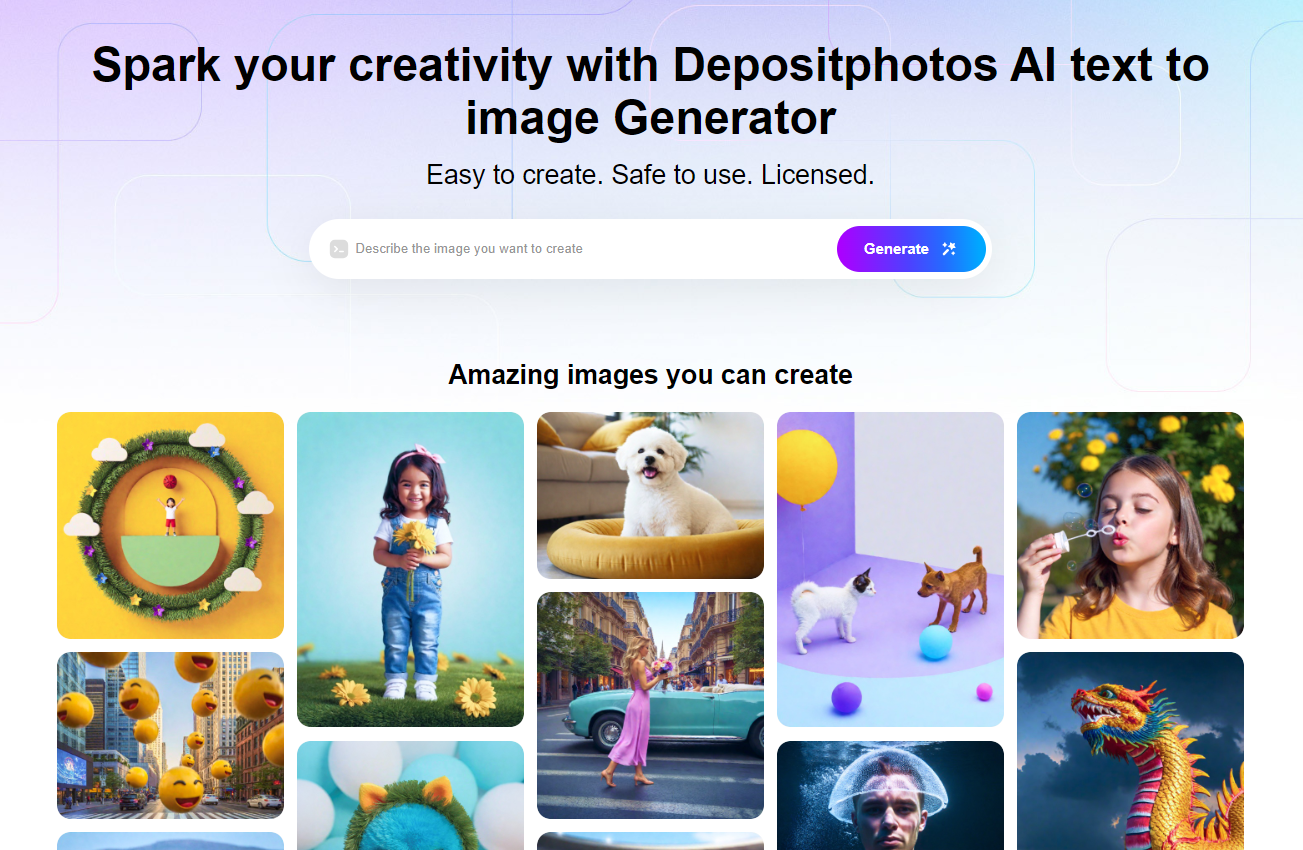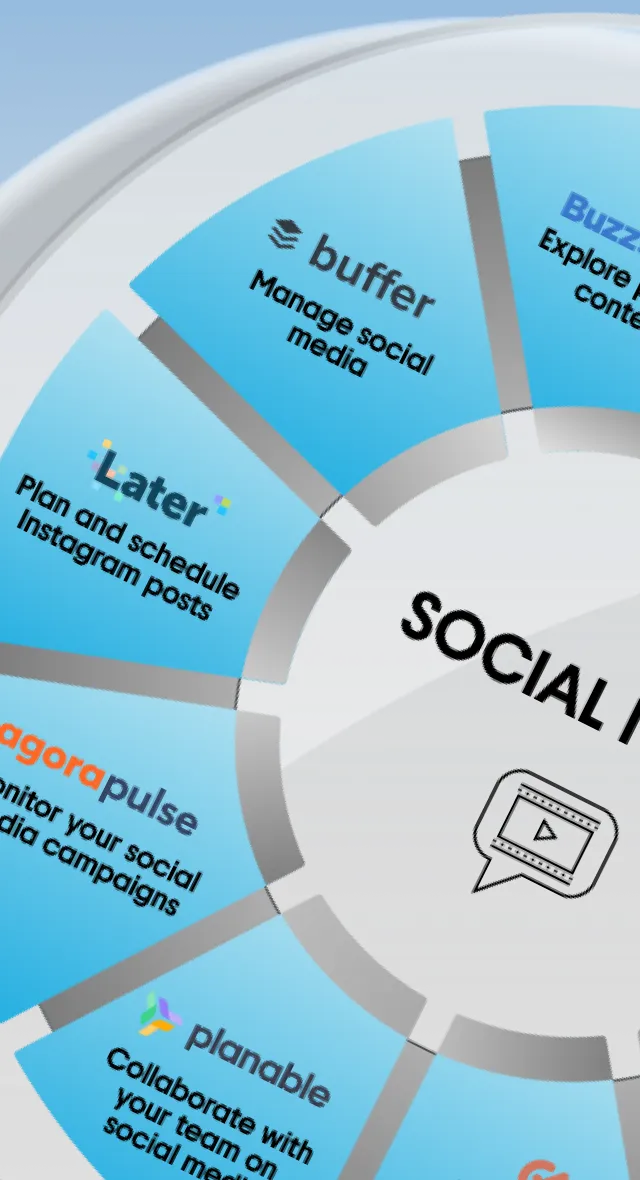AI Marketing: How to Enhance User Experience Through Automation
Today, there is no doubt that the future of marketing is closely linked to AI advancement. Moreover, 77% of companies are either using or exploring intelligent technologies, while 83% of businesses consider AI a key priority in their plans. We are witnessing the rise and rapid expansion of AI marketing, and brands that are the first to master it can gain a strong competitive advantage.
To benefit from AI marketing, you can explore the potential of intelligent tools such as AI Image Generator by Depositphotos. It lets you bring any creative idea to life and provides commercially safe visuals suitable for both digital and print projects. Check it out to get unique, high-quality images in a few clicks!
Continue reading to find out more about the essence and benefits of AI marketing and the main areas where algorithms can improve your marketing efforts!
What is AI marketing?
AI marketing represents the most innovative marketing approach, utilizing the potential of intelligent technologies, such as machine learning or natural language processing, to achieve business goals. Unlike traditional marketing, in this case, analysis and conclusions are made not by people, but by smart algorithms that help automate processes and optimize resources. AI marketing allows businesses to make data-driven decisions and create better user experiences, boosting conversions.
There are five types of AI that can be found in marketing:
- Machine learning (ML) represents a branch of AI that allows intelligent algorithms to learn from data and improve their results. For marketers, ML models are a go-to tool for understanding customer behavior. By analyzing data, they can predict channel activity and improve lead targeting.
- Generative AI is artificial intelligence intended to create content, such as text, images, audio, and videos. Generative AI models learn based on the patterns and structures of their input training data and then produce similar new data. This type of AI is the most widespread, with 73% of marketing departments already using it.
- Natural language processing (NLP) refers to computer systems designed to understand, interpret, and generate human language. This technology is at the heart of voice assistants such as Siri or Alexa. NLP opens numerous marketing opportunities, from gaining valuable insights to evaluating customer feedback.
- Conversational AI is artificial intelligence that enables machines to emulate human-like conversations in text or voice format. The most common examples of such AI are virtual assistants and chatbots. Businesses often employ them to provide uninterrupted 24/7 customer service and engage users.
- Programmatic advertising utilizes automated technology and algorithms to buy and sell digital advertising space. Such tools can bid on ads in real-time, targeting audiences more accurately. This type of AI ensures that ads reach the right people at the right time, maximizing ROI.
How to implement AI in marketing
AI has almost endless applications in marketing—from crafting personalized content to collecting and analyzing big data. Moreover, its usage in the digital environment constantly evolves, including content marketing, SMM, email marketing, affiliate marketing, and more. Let’s take a closer look at how you can harness the power of AI in your business activity.
1. Content creation and editing
Today, brands can streamline their creative process by leveraging AI tools to quickly generate various types of content, such as copy (ChatGPT), images (AI Image Generator), audio (Soundful), video (Synthesia), and beyond. While previously it could take hours for a designer to develop custom graphics, now AI creates unique visuals based on your description in seconds. See for yourself by using the AI Image Generator by Depositphotos.
Need to improve your existing content? Forget about tedious editing in Photoshop. Innovative AI tools make it possible to get desirable results with the click of a button. Whether your task is to remove an image background or enlarge a picture, you can save time and effort by delegating it to algorithms.
2. SEO
AI can not only generate, but also optimize content. Intelligent algorithms are able to evaluate the performance of content across various channels and identify which pieces perform well and which don’t. It helps businesses determine what types of content and channels are the most effective, as well as make the necessary improvements to increase traffic.
The most common cases of using AI in the context of SEO include:
- Keyword research (Ahrefs, Frase)
- Content optimization (Clearscope, MarketMuse)
- Creating copy (Jasper, Writesonic)
- Technical SEO (Sitebulb, Onely).
3. Audience segmentation
Thanks to AI’s ability to quickly process a vast amount of data, businesses can find insights that help them better understand their customers. AI audience segmentation is more profound than traditional demographic segmentation, as it can include purchasing behavior, browsing history, online interactions, and other valuable data inaccessible to human marketers. This approach provides highly detailed customer profiles. As a result, you can achieve better targeting and craft messages that are likely to resonate with different groups.
4. Personalized offers and recommendations
By obtaining deep insights into a target audience, its needs, and preferences, you can provide personalized offers that will definitely appeal to them and increase the likelihood of a purchase or other desired action. AI personalization can be applied for in-store product recommendations, smart search options, adapting homepage content or product pages, loyalty programs, and more. It is one of the most reliable ways to enhance customer engagement and loyalty, as well as improve conversion rates.
5. Email automation
AI-powered email marketing works as follows: algorithms analyze thousands of incoming messages so that marketers can create more personalized and efficient emails for subscribers. AI marketing tools may provide email teams with valuable stats, such as when recipients open their inboxes or which subject line performs better. The main applications of AI include email copy creation, email testing, email template designing, send time optimization, smart segmentation, and more.
6. Customer service and support
AI technologies have the potential to upgrade customer service. For example, you can automate communication with customers using chatbots and callbots, addressing their basic needs. It’s a proven strategy to extend customer service capabilities. Outsourcing routine, repetitive tasks to AI frees time for human experts to focus on more complex cases. In addition to better service, well-trained chatbots improve personalization, increasing client satisfaction and loyalty.
7. SMM
By processing data from social media platforms, AI helps marketers create targeted content that will be valuable to their audiences. Algorithms can make sense of what people post and comment on social media, as well as what engages them the most. They analyze not only user interactions and sentiment, but also social media trends, allowing you to develop more powerful SMM strategies. AI can also automate posting, respond to comments, or find influencers to collaborate with.
8. Predictive analytics
Modern marketers can benefit from various types of data analytics. Descriptive analytics explain what happened; diagnostic analytics answer why it happened; prescriptive analytics offer options for what to do next; and predictive analytics forecast what might happen in the future. The latter is especially critical in a fast-changing business environment. AI’s ability to predict events and trends helps make data-driven decisions and gives a solid competitive advantage.
9. Competitive analysis
You can also apply marketing AI tools to directly analyze competitors, their strategies, pricing, or market positioning. For instance, competitive sentiment analysis provides insights into how customers feel about a particular brand or product. At the same time, dynamic competitor monitoring immediately informs you about competitor product launches or changes in their activity, which allows you to respond quickly. Such techniques help brands adjust their marketing strategies and maintain their position in the market.
10. Brainstorming
You’ve probably been in situations where you feel stuck and can’t come up with new ideas. AI can be a remedy to overcome a creative block. Whether you are looking for a campaign concept, a topic for a blog post, or a catchy article headline—intelligent tolls can offer you some good options to consider. You can turn to them as a source of inspiration each time you need a creativity boost.
Benefits provided by AI marketing
At this point, we’ve highlighted the main AI marketing strategies. As you can see, intelligent technologies are applied in key areas of business activities. And it’s not surprising, given their advantages, which we will cover below.
- Automation of routine tasks. AI is an irreplaceable helper in repetitive processes that require time and effort. By delegating such tasks to AI, you can focus on more important projects, strategic planning, or looking for new opportunities.
- Big data analysis. Intelligent algorithms are able to perform numerous computations in milliseconds or even faster, allowing them to process and analyze huge amounts of data. Insights gained from the analysis allow businesses to make knowledgeable and effective decisions.
- Cost-effectiveness. Business process automation also helps significantly reduce costs. Moreover, you can use AI marketing tools for personalized budgeting, investment management, or smart savings recommendations.
- Enhanced customer experience. AI-facilitated audience segmentation and personalized offers significantly enhance the effectiveness of brand interaction. And AI-powered chatbots take user experience to the next level, ensuring better customer engagement and satisfaction.
- Better performance. Thanks to in-depth analysis, businesses better understand consumer behavior patterns and needs. It allows them to create focused strategies and offers that resonate with customers and increase profits.
- Higher competitiveness. Leveraging AI marketing gives you a solid competitive advantage by empowering you to respond quickly to market changes and deliver a first-class user experience. And predictive analytics can strengthen your brand position even further.
To sum up
Given AI’s tremendous opportunities for optimizing and automating processes, it’s unsurprising that brands are rapidly implementing intelligent technologies in their products and operations. From top-level personalization on Spotify and Netflix to crafting customizable goods provided by Nike and Coca-Cola, AI fundamentally changes how businesses operate.
In today’s business realm, 88% of marketers believe using AI will help them stay competitive and meet their customers’ expectations. Reducing operational costs, increasing efficiency, boosting profit, and enhancing customer experience—what brand would refuse this? However, choosing AI marketing tools carefully is crucial, as not all of them are business-friendly.
Start your AI marketing journey right now! Check out our AI Image Generator, which instantly creates unique and commercially safe visuals for any project.
Other articles on AI’s capabilities
7 Examples of How Product Companies Embrace Generative AI to Boost Value Proposition
“Job-Stealer” or “Co-Creator”? 5 Ways to Improve Design Quality with AI Safely














